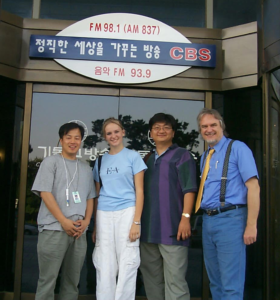
I loved riding the subway trains in Seoul. They are incredibly clean, amazingly safe and very efficient. One day I was riding home after we finished taping a radio program for the Christian Broadcasting System. The train pulled into a station and a street evangelist hopped on carrying a life-sized cross and an amplified sound system. He set up his pulpit in the center of the train and preached with all his heart to the captives on the subway who did their best not to look at him. When he finished his two-minute lesson, he looked around the car and his eyes lit up when he saw me watching him. He lit up and rushed over. Then he bent down so we were face to face, smiled from ear to ear and asked, “Are you,” he struggled to find his words in English, then he demanded, “Are you … Christian?”
Now the whole train was watching us. “Yes,” I replied smiling.
He danced triumphantly speaking in tongues and then shouted, “Hallelujah! Amen!” at the top of his lungs. People started to grin at my predicament. Then he stooped down again and asked, “Are you … Presbyterian?”
“No.”
Undaunted, the little man continued, “Are you … Catholic?”
“No,” I answered again.
Puzzled, he simply asked, “Baptist?”
“Nope.”
He was truly puzzled now. “Methodist?”
“No.”
In desperation, as the subway was slowing down to enter the station, he asked, “Mormon?”
“No!”
He couldn’t stand it. People were beginning to pick up their belongings as we slowed to a stop. Finally, he cried out, “What are you?”
I grinned from ear to ear and replied, “Just Christian!” and I jumped off the train.
People are shocked to learn there are over 33,830 different denominations in the world today.[1] This is true despite Jesus’ telling his Father, “2My prayer is not for them alone. I pray also for those who will believe in me through their message, that all of them may be one, Father, just as you are in me and I am in you,” (John 17:20-21).
So how can we all be one? Perhaps we need to first ask, “What divides us?” A simple answer might be our different doctrines and dogmas, that is, our different interpretations of what it means to be a follower of Christ. For example, the battle cry of the Reformation was “Scripture alone!” The Protestants were opposed to the idea that God’s will was revealed in the Bible and by the traditions of the church, but what is ironic is, the Protestants, whose war-cry was “Sola Scriptura” quickly codified their interpretations into creeds with the practical result, they were doing the very same thing they were protesting – following the Bible and their codified traditions.
Enter the American Restoration Movement whose cry was “Just Christian! Just Bible!” How is that possible? By depending on “book, chapter and verse” for their interpretations. The key is to have scriptural support for their practices and beliefs, but not write them down. Unfortunately, the written traditions reflected in creeds was oft times simply replaced by oral traditions. Rather than each generation searching afresh to see what God said in his Word about various questions, people began to rely on customs and traditions. (“That’s the way we’ve always done it.”)
To truly be “Just Christians” requires continual renewal and three special attitudes: (1) an agreement to allow the Bible to speak, (2) an agreement to recognize some things are simply “matters of opinion,” and (3) a commitment to love, because without love it is impossible to be a Christian.
[1] According to the World Christian Encyclopedia published by Oxford Press, in 2001 there were 33,830 denominations claiming to be “Christian.”
